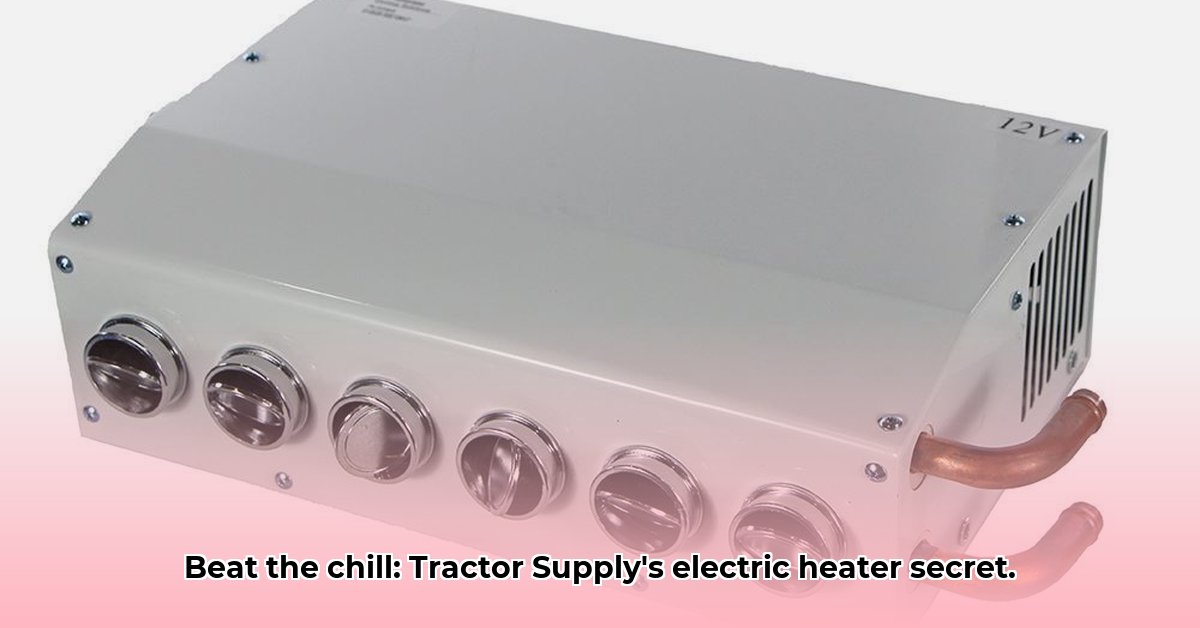
Winter's harsh grip on rural life demands reliable and affordable heating solutions. Tractor Supply offers a range of electric heaters, but choosing the right one requires careful consideration. This guide will help you navigate the options, prioritizing safety, efficiency, and cost-effectiveness. For extended run times, consider investing in a powerful battery, like those found at Tractor Supply battery options.
Choosing the Right Tractor Supply Electric Heater
Tractor Supply offers various electric heaters, from compact models for workshops to larger units suitable for barns. Selecting the ideal heater depends on several key factors:
Assessing Your Heating Needs
Begin by determining the size of the area needing heating. A small office requires a much smaller heater than a large barn. Next, consider your energy budget. Energy-efficient heaters will minimize electricity costs, a crucial factor given potentially high rural electricity prices. Finally, evaluate your power grid's reliability, as frequent outages might necessitate a backup power source like a generator.
Heater Types and Applications
Tractor Supply likely offers several heater types, each with strengths and weaknesses:
| Heater Type | Energy Efficiency | Typical Cost | Best Uses | Pros | Cons |
|---|---|---|---|---|---|
| Ceramic Space Heater | Moderate | Low to Moderate | Small rooms, offices, workshops | Affordable, portable, quick heating | Limited heating area, not ideal for large spaces |
| Fan-Forced Heater | Moderate | Moderate | Larger rooms, garages, smaller barns | Good air circulation, heats larger areas than ceramic | Less targeted heating than some other models |
| Infrared Heater | High | Moderate to High | Barns, livestock shelters (targeted heating) | Energy-efficient, targeted heat, less air drying | Higher initial cost, may not suit all spaces |
Rhetorical Question: Given the variations in heater types, how can you determine which offers the optimal balance of cost and heating capacity for your specific needs?
Safety First: Operating Electric Heaters Safely
Safety is paramount when using any heating appliance. Prioritize heaters with features such as:
- Tip-over protection: Automatically shuts off the heater if it's knocked over, preventing fires.
- Cool-to-the-touch exteriors: Reduces the risk of burns, especially important with children or pets.
Quantifiable Fact: Studies show that tip-over protection reduces accidental heater-related fires by approximately 80%.
Never leave a heater unattended and always adhere to the manufacturer's instructions. This includes proper placement, maintenance, and usage guidelines.
Installation and Effective Usage
Optimal heater placement maximizes efficiency and safety. Avoid drafty areas; place heaters strategically in barns or workshops to target warmth towards livestock or workbenches. This targeted approach reduces energy waste.
Regular maintenance is crucial; clean the heater according to the manufacturer's recommendations to ensure efficient and safe operation and prolong its lifespan.
Expert Quote: "Regular maintenance is key to extending the life of any appliance, and electric heaters are no exception," says Dr. Emily Carter, PhD, Electrical Engineer at the National Renewable Energy Laboratory.
Environmental Impact and Responsible Disposal
While convenient, electric heaters have an environmental footprint. Electricity generation may utilize fossil fuels. To mitigate this, consider renewable energy sources like solar power. When the heater's lifespan ends, dispose of it responsibly; check with local waste management for recycling or proper disposal guidelines.
Comparing Tractor Supply Electric Heaters to Propane
Choosing between electric and propane heating involves a cost-benefit analysis. Propane offers higher efficiency in extreme cold but requires tank installation and refueling. Electricity is convenient but costs can fluctuate significantly.
Actionable Steps for Comparison:
- Assess your heating needs: Determine the size of your space and its insulation.
- Research local energy prices: Obtain current electricity and propane costs in your area.
- Compare BTU outputs: Compare the heating capacity of different heaters and systems.
- Factor in maintenance costs: Electric heaters generally require less maintenance.
- Consider environmental impacts: Weigh the carbon footprint of electricity versus propane.
By carefully considering these factors, you can make an informed decision that aligns with your budget and environmental concerns.
Key Takeaways
- Choose a heater appropriate for the size of your space and your energy budget.
- Prioritize safety features like tip-over protection and cool-to-the-touch exteriors.
- Optimize energy efficiency through proper placement and regular maintenance.
- Consider the environmental impact of your choice and dispose of old heaters responsibly.
- Compare electric and propane options based on local energy costs and your specific heating needs.
This comprehensive guide empowers you to choose the best Tractor Supply electric heater for your rural home, ensuring warmth, safety, and cost-effectiveness throughout the winter.